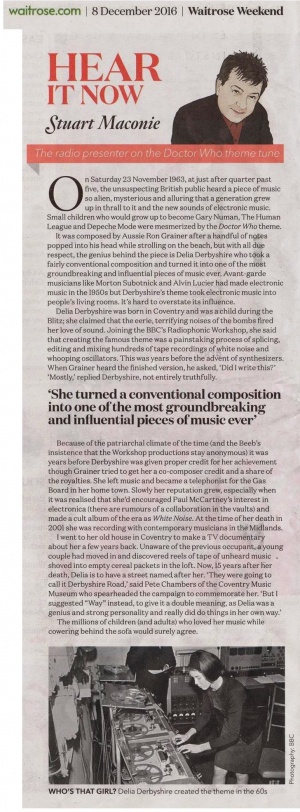Hear It Now
- Publication: Waitrose Weekend
- Date: 2016-12-08
- Author: Stuart Maconie
- Page: 44
- Language: English
The radio presenter on the Doctor Who theme tune
On Saturday 23 November 1963, at just after quarter past five, the unsuspecting British public heard apiece of music so alien, mysterious and alluring that a generation grew up in thrall to it and the new sounds of electronic music. Small children who would grow up to become Gary Numan, The Human League and Depeche Mode were mesmerized by the Doctor Who theme.
It was composed by Aussie Ron Grainer after a handful of notes popped into his head while strolling on the beach, but with all due respect, the genius behind the piece is Delia Derbyshire who took a fairly conventional composition and turned it into one of the most groundbreaking and influential pieces of music ever. Avant-garde musicians like Morton Subotnick and Alvin Lucier had made electronic music in the 1950s but Derbyshire's theme took electronic music into people's living rooms. It's hard to overstate its influence.
Delia Derbyshire was born in Coventry and was a child during the Blitz; she claimed that the eerie, terrifying noises of the bombs fired her love of sound. Joining the BBC's Radiophonic Workshop, she said that creating the famous theme was a painstaking process of splicing, editing and mixing hundreds of tape recordings of white noise and whooping oscillators. This was years before the advent of synthesizers. When Grainer heard the finished version, he asked, 'Did I write this?' 'Mostly,' replied Derbyshire, not entirely truthfully.
'She turned a conventional composition into one of the most groundbreaking and influential pieces of music ever'
Because of the patriarchal climate of the time (and the Beeb's insistence that the Workshop productions stay anonymous) it was years before Derbyshire was given proper credit for her achievement though Grainer tried to get her a co-composer credit and a share of the royalties. She left music and became a telephonist for the Gas Board in her home town. Slowly her reputation grew, especially when it was realised that she'd encouraged Paul McCartney's interest in electronica (there are rumours of a collaboration in the vaults) and made a cult album of the era as White Noise. At the time of her death in 2001 she was recording with contemporary musicians in the Midlands.
I went to her old house in Coventry to make a TV documentary about her a few years back. Unaware of the previous occupant, a young couple had moved in and discovered reels of tape of unheard music shoved into empty cereal packets in the loft. Now, 15 years after her death, Delia is to have a street named after her. 'They were going to call it Derbyshire Road,' said Pete Chambers of the Coventry Music Museum who spearheaded the campaign to commemorate her. 'But I suggested "Way" instead, to give it a double meaning, as Delia was a genius and strong personality and really did do things in her own way.'
The millions of children (and adults) who loved her music while cowering behind the sofa would surely agree.
Caption: WHO'S THAT GIRL? Delia Derbyshire created the theme in the 60s
Disclaimer: These citations are created on-the-fly using primitive parsing techniques. You should double-check all citations. Send feedback to whovian@cuttingsarchive.org
- APA 6th ed.: Maconie, Stuart (2016-12-08). Hear It Now. Waitrose Weekend p. 44.
- MLA 7th ed.: Maconie, Stuart. "Hear It Now." Waitrose Weekend [add city] 2016-12-08, 44. Print.
- Chicago 15th ed.: Maconie, Stuart. "Hear It Now." Waitrose Weekend, edition, sec., 2016-12-08
- Turabian: Maconie, Stuart. "Hear It Now." Waitrose Weekend, 2016-12-08, section, 44 edition.
- Wikipedia (this article): <ref>{{cite news| title=Hear It Now | url=http://cuttingsarchive.org/index.php/Hear_It_Now | work=Waitrose Weekend | pages=44 | date=2016-12-08 | via=Doctor Who Cuttings Archive | accessdate=20 December 2025 }}</ref>
- Wikipedia (this page): <ref>{{cite web | title=Hear It Now | url=http://cuttingsarchive.org/index.php/Hear_It_Now | work=Doctor Who Cuttings Archive | accessdate=20 December 2025}}</ref>
